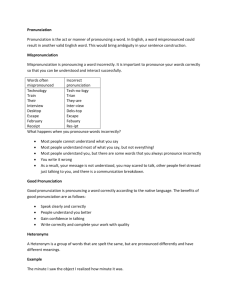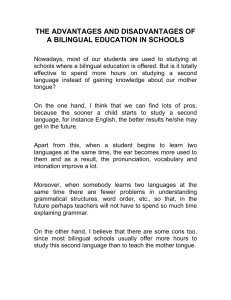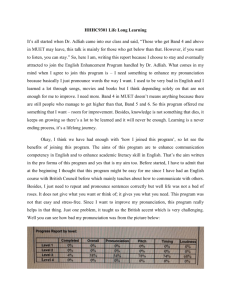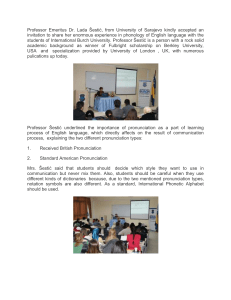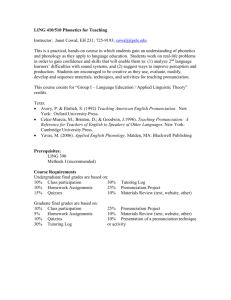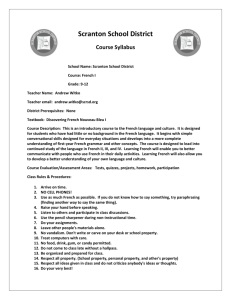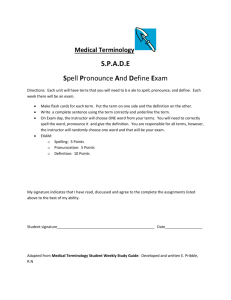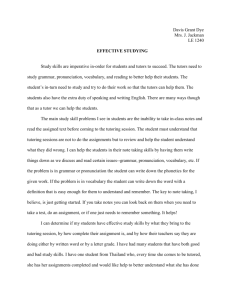French Pronunciation
advertisement
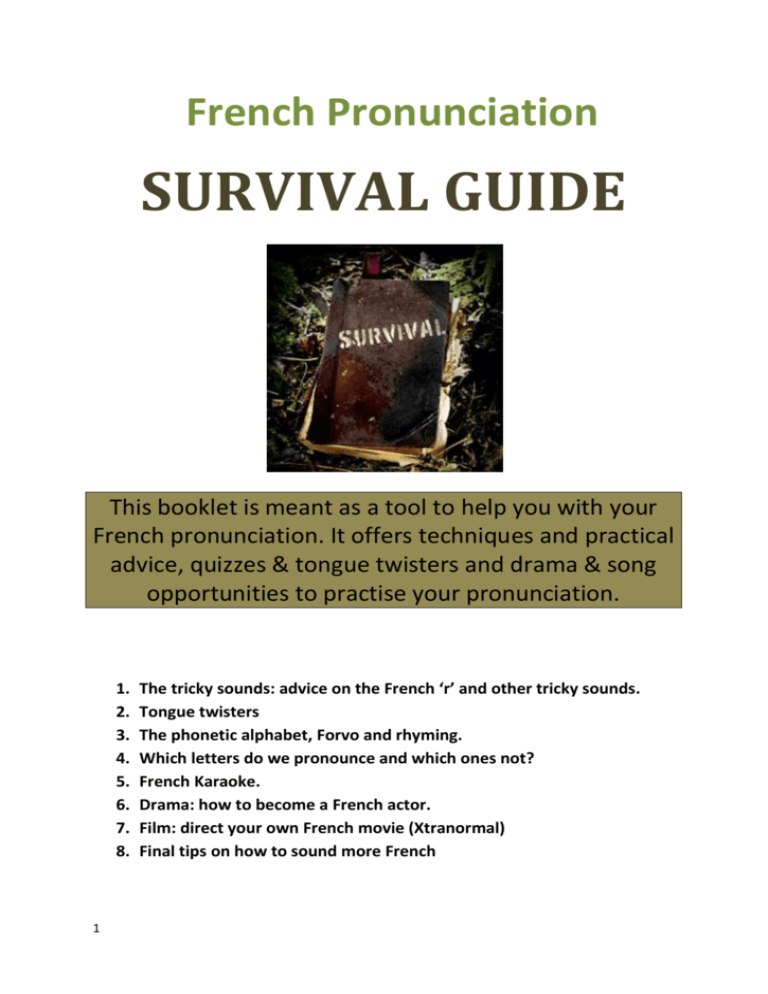
French Pronunciation SURVIVAL GUIDE This booklet is meant as a tool to help you with your French pronunciation. It offers techniques and practical advice, quizzes & tongue twisters and drama & song opportunities to practise your pronunciation. 1. 2. 3. 4. 5. 6. 7. 8. 1 The tricky sounds: advice on the French ‘r’ and other tricky sounds. Tongue twisters The phonetic alphabet, Forvo and rhyming. Which letters do we pronounce and which ones not? French Karaoke. Drama: how to become a French actor. Film: direct your own French movie (Xtranormal) Final tips on how to sound more French 1. The tricky sounds: advice on the French ‘r’ and other tricky sounds. One of the more difficult sounds for non-native speakers remains the French ‘r’. This gargling sound is not produced with your tongue, but with your throat. To make sure that you are not tempted to use your tongue to produce the ‘r’ sound, place the tip of a pen/pencil at the tip of your tongue (to keep it steady) while you try to produce the French ‘r’. Do not stick your tongue out; just leave it inside your mouth. The pencil will make sure that you won’t try to use your tongue to produce the (English) r sound. The tip of your tongue should touch your lower front teeth. For a detailed explanation on how to pronounce the French ‘r’, look at the following ‘French sounds’ video on Youtube: French R: http://www.youtube.com/watch?v=BsErE00ItH0 2 Another tricky sound is the ‘u’ from the word ‘tu’ or ‘une’. Many English speakers tend to pronounce the ‘u’ as ‘oo’ like in book because the former sound does not exist in English. Your tongue position is central to the correct pronunciation of ‘tu’. In fact, you need to place your tongue where you would place it to pronounce the English ‘ee’ (as in free) of the French ‘i’ (as in ‘Paris’). The video on the link below will take you through the pronunciation step by step. http://www.youtube.com/watch?v=x4XFrRnCOvM&list=UU2L9w7ozDeUl1w5ZjUPCOQA&index=14&feature=plcp If you found this advice useful, look through the entire selection of sound videos of ‘French sounds’ on Youtube. http://www.youtube.com/user/frenchsounds 3 2. Tongue twisters The selection below comes from http://www.momes.net/education/oral/1/apron oncer.htm To practise the sounds you have just learned, have some fun with the following tongue twisters. Do not worry about their meaning too much; the main aim is to pronounce the sounds correctly. Le chasseur sachant chasser sans son chien, est un bon chasseur. Son chat chante sa chanson. Le ver vert va vers le verre vert Les chaussettes de l'Archiduchesse sont-elles sèches, archi-sèches? Gros gras grand grain d'orge, tout gros-gras-grand-grain-d'orgerisé, quand te dé-gros-gras-grand-grain-d'orgeriseras-tu? Je me dé-gros-grasgrand-grain-d'orgeriserai quand tous les gros gras grands grains d'orge se seront dé-gros-gras-grand-grain-d'orgerisés. Dans la gendarmerie, quand un gendarme rit, tous les gendarmes rient dans la gendarmerie. Pourquoi les alliés ne se désolidariseraient-ils pas. Ces cerises sont si sûres qu'on ne sait pas si c'en sont. 4 Je suis ce que je suis et si je suis ce que je suis, qu'est-ce que je suis? Un pâtissier qui pâtissait chez un tapissier qui tapissait, dit un jour au tapissier qui tapissait: vaut-il mieux pâtisser chez un tapissier qui tapisse ou tapisser chez un pâtissier qui pâtisse? Il était une fois, un homme de foi qui vendait du foie dans la ville de Foix. Il dit ma foi, c'est la dernière fois que je vends du foie dans la ville de Foix. Tatie, ton thé t'a-t-il ôté ta toux, disait la tortou au tatou. Mais pas du tout, dit le tatou, Je tousse tant que l'on m'entend de Tahiti au Toumbouctou C'est l'évadé du Nevada qui dévalait dans la vallée, dans la vallée du Nevada, qu'il dévalait pour s'évader, sur un vilain vélo volé, qu'il a volé dans une villa, et le valet qui fut volé vit l'évadé du Nevada qui dévalait dans la vallée, dans la vallée du Nevada, qu'il dévalait pour s'évader sur un vilain vélo volé. Il y a les papas Papous à poux, les Papous pas papas à poux, et les Papoux pas papas pas à poux. Les vers verts levèrent le verre vert vers le ver vert. Trois petites truites crues 5 To make the exercise more entertaining, cut up the tongue twisters, put them in the middle of the table and use them as a game: time your opponent and see how many tongue twisters he or she pronounces correctly within one minute. Each correct tongue twister can be kept; the other ones must be put back. The player with the most tongue twisters is the winner. Check out how native speakers struggle with tongue twisters: http://www.tv5.org/TV5Site/publication/galerie-39-1Les_virelangues.htm 6 4. The phonetic alphabet, ‘Forvo’ and rhyming. One of the more difficult things with pronunciation is knowing how to pronounce each sound. Understanding the International Phonetic Alphabet will help you with this. If you open a (bilingual) dictionary, you will more than likely see some funny symbols between brackets at the back of each word. These symbols are the letters of the phonetic alphabet. To know which sound they represent, have a look at the grid* below. *The symbol for the French ‘r’ is R Now that you understand this alphabet, how would you write down the pronunciation of the following French words with the phonetic alphabet? If you are ready, check in a dictionary of your answer was correct. Mouton: lapin: garage: Chat: canard: français: 7 If all this is too complicated and if you have access to a computer, you can always look at the following website, where native speakers offer you the pronunciation of difficult words. Just select your language, type in the word you want and listen. This, by the way, can be an excellent resource to prepare you for official speaking examinations and other assessments. www.forvo.com You can choose your language and browse for pronunciations. Or you can type in a word in the language, then select your language and choose a pronunciation. http://www.voki.com/ Or create an avatar on voki. 8 To be able to rhyme, you must pronounce words correctly, so don’t forget to check the pronunciation of difficult words in a dictionary (if you can read the phonetic alphabet or through www.forvo.com (if you can’t). Now try to find rhyming words for the following set of words: beau danse géographie ensemble école tard amour As you may have noticed, rhyming in a different language is actually a lot more difficult than may appear at first sight. This is why the following online rhyming dictionary can be useful: http://rime-en.fr/ Now try to find some other rhyming words for the same set of words, by accessing the online rhyming dictionary mentioned above. beau danse géographie ensemble école tard amour 9 5. Which letters do we pronounce and which ones not? Unfortunately, French is not a phonetic language, so there is no transparent sound-writing relationship. This makes it hard to pronounce written text in French, as you don’t always know how to pronounce each sound. On top of that, in French there are many letters which you should not pronounce at all. The following website gives excellent and thorough advice on the notion of silent letters. The summaries in the boxes are direct quotes from this website. http://french.about.com/library/pronunciation/bl-lettresmuettes.htm There are three categories of silent letters in French. In a nutshell: E muet / Elision Final consonants H muet and aspiré Where does the letter E represent an E muet? A. In the nine single syllable words with one consonant ce, de, je, le, me, ne, que, se, te B. At the end of a word, possibly followed by other silent letters homme femmes parlent C. In the non-final syllable of a word, after a consonant sound and before one of the following: 1. single consonant sound devoirs recherche logement 2. consonant + liquid consonant° chevronné secrétaire replacer D. 10 Miscellaneous 1. The re- prefix in front of ss ressortir ressource 2. These three words dessous dessus dehors The basic rule of French pronunciation for final consonants is that the final consonant is not pronounced, but there are many exceptions The letters B, C, F, K, L, Q, and R are usually pronounced at the end of a word. Tip: Since B, K, and Q are rare as final consonants, some people find it helpful to use the word CaReFuL to remember the most common of the usually pronounced final consonants. The other French consonants are usually silent at the end of a word, with some exceptions. Tip: many exceptions are proper names or words borrowed from other languages. The letters M and N are usually silent, but remember that they cause the vowel preceding them to be nasal. The letter H is always silent in French. However, there are two different kinds of H's: H muet and H aspiré. The type of H at the beginning of the word lets you know whether to make contractions and pronounce liaisons with that word. To find out whether the H in a particular word is muet or aspiré, check a good French dictionary. There will be an asterisk or some other symbol to distinguish the two kinds of H's. 11 6. French Karaoke. Music is a superb resource when it comes to pronunciation. Download French songs, put them on your Iphones and sing along! Youtube also has a wealth of good songs available, which often include the lyrics, so you can do your own French Karaoke. If you are not a good singer, don’t worry. French rap is pretty amazing and rapping is a fantastic way to practise your pronunciation. See below a selection of songs and raps which work very well. Check out the links on Youtube, look at or print off the lyrics and have fun with your pronunciation! Elle me dit (Mika): http://www.youtube.com/watch?v=NiHWwKC8WjU Search for the lyrics online and print them off. 12 Alors on danse (Stromae): http://www.youtube.com/watch?v=GJCQDd4vYjg Lyrics included in the video link Ca m’énerve (Helmut Fritz): 13 Careful: done in a mock German accent! (Lyrics included in the video) http://www.youtube.com/watch?v=ffk9GioKkVk Jour de paix (113 et Blacko): http://www.youtube.com/watch?v=bwx-WbNv_ho Lyrics included in the video 14 Celui (Colonel Reyel): http://www.youtube.com/watch?v=rRFgl2-PzHg Lyrics included in the video 7. Drama: how to become a French actor. Another brilliant way to focus on your French pronunciation is by acting out French playscripts. The link below gives you the choice between a range of short, adapted playscripts. The French Star Wars play script works particularly well and is brilliant as an end of term project. http://www.play-script-and-song.com/fsl-french-activities.html 15 Je suis ton père! 8. Film: direct your own French movie To familiarise yourself with the sounds of the French language, you can also direct your own French animated movie through the use of the website mentioned below. In this case, you will need to prepare your own script or use an existing script. This one could be as simple as a role play. You can create your own backgrounds, actions etc and make the actors say your lines in French. Unfortunately, you need to pay if you want to publish and save your 16 sources. However, you can do a free trial session, which is pretty fun, so have a try! http://www.xtranormal.com/ 9. Final tips on how to sound more French The French speak with their hands. They also make a lot of ‘sounds’ which cannot be found in the dictionary, but are really part of everyday French conversations. Finally, don’t be afraid of exaggerating your intonation. Try to have a conversation with your neighbour pretending to be a French person speaking English with a French accent. What did you notice? What did you do? 17 Which sounds did you exaggerate? Now try to do the same when you speak French yourself. Strangely enough most pupils are quite good at imitating a French person speaking English, but they often forget to apply the same language features to their own French pronunciation. And if all this is too hard, you can always fake you French! Have a look at how Joey tries to sound French without being able to speak a word of it by accessing the following clip: http://www.youtube.com/watch?v=w5O9EuWttaM&feature=related 18 Bonne Chance! And have fun with your pronunciation! 19
